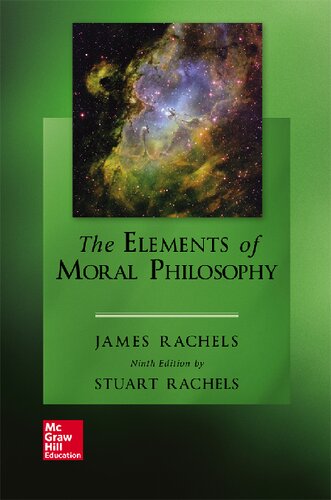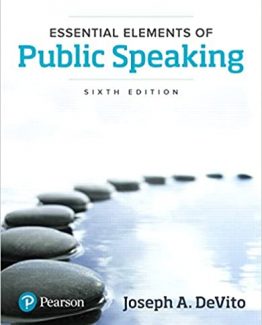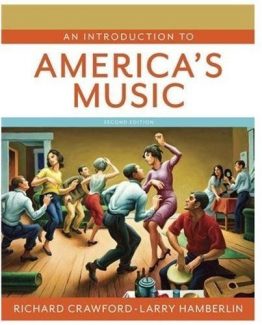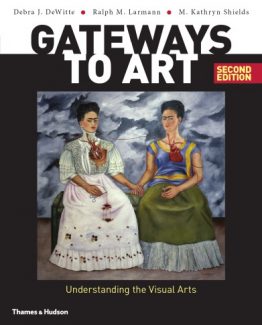The Elements of Moral Philosophy 9th Edition by James Rachels, ISBN-13: 978-1259914256
[PDF eBook eTextbook]
- Publisher: McGraw Hill; 9th edition (March 20, 2018)
- Language: English
- 224 pages
- ISBN-10: 1259914259
- ISBN-13: 978-1259914256
The Elements of Moral Philosophy 9e by James Rachels and Stuart Rachels is a best-selling text for undergraduate courses in ethics. Thirteen thought-provoking chapters introduce readers to major moral concepts and theories in philosophy through clear, understandable explanations and compelling discussions. Chapters are written so that they may be read independently of one another thus providing greater flexibility for students and instructors.
Table of Contents:
Cover
Title Page
Copyright
About the Authors
Contents
Preface
About the Ninth Edition
1. What Is morality?
1.1. The Problem of Definition
1.2. First Example: Baby Theresa
1.3. Second Example: Jodie and Mary
1.4. Third Example: Tracy Latimer
1.5. Reason and Impartiality
1.6. The Minimum Conception of Morality
Notes on Sources
2. The Challenge of Cultural Relativism
2.1. Different Cultures Have Different Moral Codes
2.2. Cultural Relativism
2.3. The Cultural Differences Argument
2.4. What Follows from Cultural Relativism
2.5. Why There Is Less Disagreement Than There Seems to Be
2.6. Some Values Are Shared by All Cultures
2.7. Judging a Cultural Practice to Be Undesirable
2.8. Back to the Five Claims
2.9. What We Can Learn from Cultural Relativism
Notes on Sources
3. Subjectivism in Ethics
3.1. The Basic Idea of Ethical Subjectivism
3.2. The Linguistic Turn
3.3. The Denial of Value
3.4. Ethics and Science
3.5. Same-Sex Relations
Notes on Sources
4. Does Morality Depend on Religion?
4.1. The Presumed Connection between Morality and Religion
4.2. The Divine Command Theory
4.3. The Theory of Natural Law
4.4. Religion and Particular Moral Issues
Notes on Sources
5. Ethical Egoism
5.1. Is There a Duty to Help the Starving?
5.2. Psychological Egoism
5.3. Three Arguments for Ethical Egoism
5.4. Two Arguments against Ethical Egoism
Notes on Sources
6. The Social Contract Theory
6.1. Hobbes’s Argument
6.2. The Prisoner’s Dilemma
6.3. Some Advantages of the Social Contract Theory
6.4. The Problem of Civil Disobedience
6.5. Difficulties for the Theory
Notes on Sources
7. The Utilitarian Approach
7.1. The Revolution in Ethics
7.2. First Example: Euthanasia
7.3. Second Example: Marijuana
7.4. Third Example: Nonhuman Animals
Notes on Sources
8. The Debate over Utilitarianism
8.1. The Classical Version of the Theory
8.2. Is Pleasure All That Matters?
8.3. Are Consequences All That Matter?
8.4. Should We Be Equally Concerned for Everyone?
8.5. The Defense of Utilitarianism
8.6. Concluding Thoughts
Notes on Sources
9. Are There Absolute Moral Rules?
9.1. Harry Truman and Elizabeth Anscombe
9.2. The Categorical Imperative
9.3. Kant’s Arguments on Lying
9.4. Conflicts between Rules
9.5. Kant’s Insight
Notes on Sources
10. Kant and Respect for Persons
10.1. Kant’s Core Ideas
10.2. Retribution and Utility in the Theory of Punishment
10.3. Kant’s Retributivism
Notes on Sources
11. Feminism and the Ethics of Care
11.1. Do Women and Men Think Differently about Ethics?
11.2. Implications for Moral Judgment
11.3. Implications for Ethical Theory
Notes on Sources
12. Virtue Ethics
12.1. The Ethics of Virtue and the Ethics of Right Action
12.2. The Virtues
12.3. Two Advantages of Virtue Ethics
12.4. Virtue and Conduct
12.5. The Problem of Incompleteness
12.6. Conclusion
Notes on Sources
13. What Would a Satisfactory Moral Theory Be Like?
13.1. Morality without Hubris
13.2. Treating People as They Deserve
13.3. A Variety of Motives
13.4. Multiple-Strategies Utilitarianism
13.5. The Moral Community
13.6. Justice and Fairness
13.7. Conclusion
Notes on Sources
Index
James Rachels, the distinguished American moral philosopher, was born in Columbus, Georgia. He graduated from Mercer University in Macon in 1962. He received his PhD in 1967 from the University of North Carolina, Chapel Hill. He taught at the University of Richmond, New York University, the University of Miami, Duke University, and the University of Alabama at Birmingham, where he spent the last twenty-six years of his career.1971 saw the publication of Rachels’ groundbreaking textbook Moral Problems, which ignited the movement in America away from teaching ethical theory towards teaching concrete practical issues. Moral Problems sold 100,000 copies over three editions. In 1975, Rachels wrote “Active and Passive Euthanasia,” arguing that the distinction so important in the law between killing and letting die has no rational basis. Originally appearing in the New England Journal of Medicine, this essay has been reprinted roughly 300 times and is a staple of undergraduate education. The End of Life (1986) was about the morality of killing and the value of life. Created from Animals (1990) argued that a Darwinian world-view has widespread philosophical implications, including drastic implications for our treatment of nonhuman animals. Can Ethics Provide Answers? (1997) was Rachels’ first collection of papers (others are expected posthumously). Rachels’ McGraw-Hill textbook, The Elements of Moral Philosophy, is now in its fourth edition and is easily the best-selling book of its kind.
Over his career, Rachels wrote 5 books and 85 essays, edited 7 books and gave about 275 professional lectures. His work has been translated into Dutch, Italian, Japanese, and Serbo-Croatian. James Rachels is widely admired as a stylist, as his prose is remarkably free of jargon and clutter. A major theme in his work is that reason can resolve difficult moral issues. He has given reasons for moral vegetarianism and animal rights, for affirmative action (including quotas), for the humanitarian use of euthanasia, and for the idea that parents owe as much moral consideration to other people’s children as they do to their own. James Rachels died of cancer on September 5th, 2003, in Birmingham, Alabama.
Stuart Rachels is Associate Professor of Philosophy at the University of Alabama. He has revised several of James Rachels’ books, including Problems from Philosophy (second edition, 2009) and The Right Thing to Do, which is the companion anthology to this book. Stuart won the United States Chess Championship in 1989 at the age of 20, and he is a Bronze Life Master at bridge. His website is www.jamesrachels.org/stuart.
What makes us different?
• Instant Download
• Always Competitive Pricing
• 100% Privacy
• FREE Sample Available
• 24-7 LIVE Customer Support





